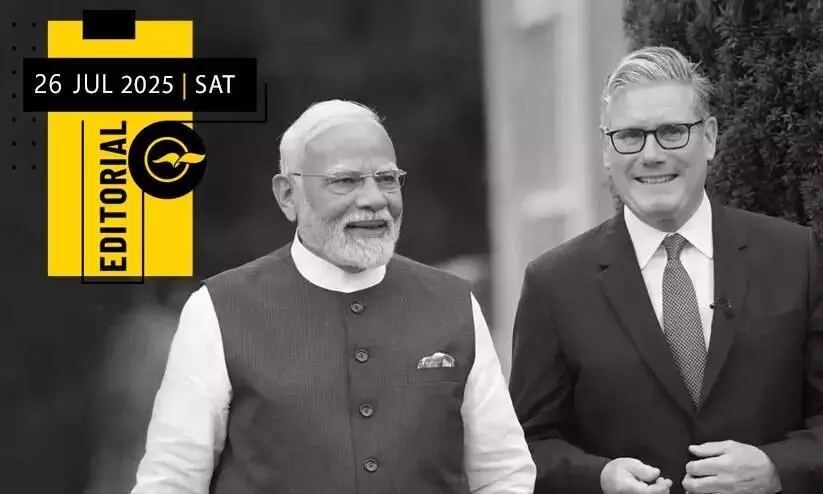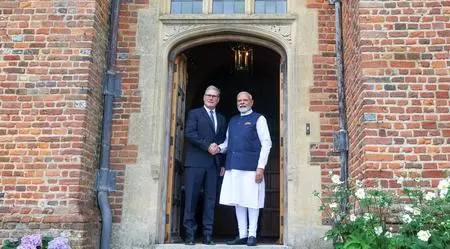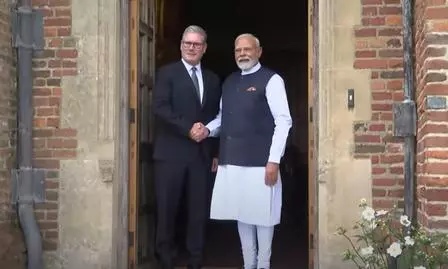
India-UK Free trade agreement
text_fieldsAfter three years of negotiations, India and Britain have signed a strategic and historic Free Trade Agreement. The Comprehensive Economic and Trade Agreement (CETA) is widely seen as a major boost to the economies of both countries. The multi-faceted agreement, which eliminates tariffs on 99 percent of goods and services exported from India and significantly reduces tariffs on many British products imported into India, is expected to generate bilateral trade worth US$34 billion. The agreement is also expected to allow British universities to open campuses in India and bring more job opportunities to Indians in the UK. The agreement was signed by Union Minister for Commerce and Industry Piyush Goyal and British Secretary of State for Business and Trade Jonathan Reynolds after a meeting between Prime Minister Narendra Modi and British Prime Minister Keir Starmer. Although the agreement has been signed, some procedures remain, including seeking approval from the British Parliament.
The initial negotiations for this agreement began when Boris Johnson was the British Prime Minister. Amid the political and economic uncertainties in post-Brexit Britain, Boris Johnson, a far-right politician, entered into trade negotiations with the Indian government, which had similar political views. For Britain, it was also a survival attempt to recover from the shock of Brexit. However, the negotiations dragged on due to disagreements over many provisions of the agreement. In the meantime, the political climate in Britain changed. After Boris, Liz Truss and then Rishi Sunak came to power. In the 2024 general election, Boris and Rishi Sunak's Conservative Party suffered a major setback and stepped down from power. Instead, the Labour Party, led by Keir Starmer, came to power. While racism and anti-immigration were strong under the Conservative government, Starmer's government adopted a slightly more liberal approach. That is reflected in this agreement as well. It also has the distinction of being the biggest deal signed by Britain since Brexit. Alongside this, the agreement also explores whether such a move can help overcome the intensifying global trade war unleashed by Donald Trump.
According to the UK's Department for Business and Trade, if the agreement comes into force, exports from the country to India will increase by 60 percent by 2040. This will result in an additional trade of US$20 billion. India's exports will increase by 25 percent during the same period. Exports of Indian products, including those from Kerala, are expected to increase significantly. This will also benefit workers in the respective sectors. In the agricultural sector, Makhana (lotus seeds), Shahi litchi, Araku coffee, Kashmiri saffron, etc. will also shine in the UK market. The fact that about 95 percent of agricultural products and processed food products, including fruits, vegetables, grains, turmeric, pepper, cardamom, processed mango pulp, pickles, etc., will not be subject to tax will be a great advantage for the country's farmers and industrialists. It is also estimated that even if India suffers a setback in the US seafood market due to Trump's tariff war, this agreement will help it regain it through the British market.
At the same time, there is also a concern that reducing import duties on British products will significantly affect Indian products and services. Currently, the import duty on British vehicles is 100 percent. It remains to be seen how the Indian vehicle market will be affected by reducing it to one-tenth. According to the agreement, the field is being prepared for 100 percent foreign investment in the telecom sector in India. British companies can provide direct services in the telecom sectors. As per the agreement, they will be considered as Indian companies. How this will affect private telecom and construction companies in India can easilybe imagined. Although Starmer's Labor Party government is not generally anti-migrant, there is no significant announcement in this regard in the agreement. The agreement states that yoga instructors, classical music teachers, etc. will be given 1,800 visas in an annual quota but there is no mention of visas for people in the IT sector, businessmen, etc. The agreement also does not raise any expectations regarding the restoration of visas for students who go to Britain from India for studies after completing their courses. While it will lead to a surge in exports and related jobs, it is not without its risks. There are dangers lurking here too in opening up the Indian market.








